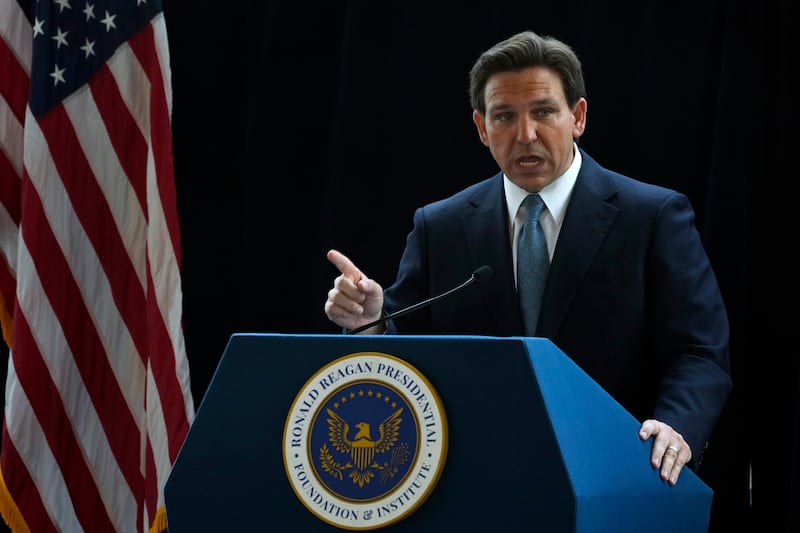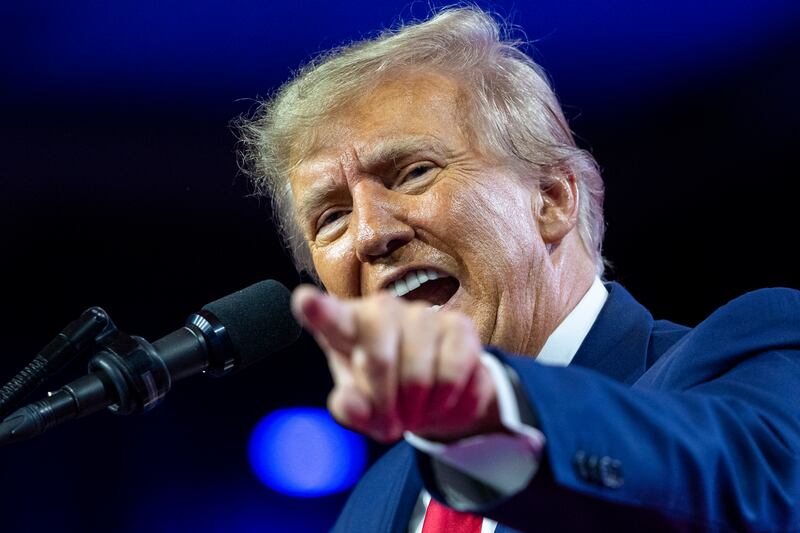A conference that was once a critical stop for Republican presidential candidates now seems completely dedicated to the “MAGA” movement, dominated by the merch and supporters of former President Donald Trump, who headlined the event.
But the 50th annual Conservative Political Action Conference (CPAC) was also colored by a few not-so-subtle jabs at the nation’s 45th commander-in-chief by other 2024 hopefuls, as well as the notable absence of some of conservatism’s biggest names, throwing doubt on the continued relevance of the event.
“There’s a lot of chatter in the media about who’s here and not here,” said CPAC chairman Matt Schlapp on Thursday, the second day of the event which ran through Saturday evening.
CPAC has long been an important stop for Republican congressmen, candidates and cable news celebrities — calling itself “the largest and most influential gathering of conservatives in the world” — but recently it has come under increasing fire.
Earlier this year, Schlapp was accused of sexually assaulting a Republican strategist working on Herschel Walker’s Senate campaign. In 2017 and 2021, the conference rescinded invitations to speakers who were recorded making anti-semitic and paedophilic remarks.
But this year, the proceedings were defined as much by who wasn’t there, as who was.
Testing out new and old messages
This year’s prominent speakers included House Freedom Caucus provocateurs Reps. Jim Jordan, R-Ohio, Marjorie Taylor Greene, R-Ga., and Matt Gaetz, R-Fla.; outspoken conservative favorites Sens. Ted Cruz, R-Tex., Rick Scott, R-Fla., and J.D. Vance, R-Ohio; and other right-wing media regulars, like former Arizona gubernatorial candidate Kari Lake, election security activist Mike Lindell, and Trump strategist Steve Bannon.
Messages at the conference, whose theme was “Protecting America Now,” focused mostly on criticism of the Biden administration’s spending, particularly in Ukraine, and “woke” elements of the culture war, like transgender issues.
Though topics like these have become staples at CPAC, last weekend’s conference was the first in seven years to feature potential presidential nominees hoping to take Trump’s place at the head of the party.
Former Secretary of State Mike Pompeo, who is expected to announce a presidential campaign this spring, and former South Carolina Gov. and Ambassador to the U.N. Nikki Haley, who announced her presidential run last month, were among those attempting to walk the difficult line between winning over the Republican base while not treading on the reputation of its favorite president.
“I’m running for president to renew an America that’s strong and proud, not weak and woke,” Haley said as she articulated her own vision of “make America great again.”
While Pompeo and Haley took pains to praise Trump and communicate an America first agenda, Haley and Pompeo also took aim at the former president with indirect criticism centered around electability and the need to have a conservative message that can appeal to a majority of the country.
“We lost three elections in a row. In the popular vote it’s seven of the last eight,” Pompeo said. “We need a conservative party that we can be proud to call home again, rooted in our founding ideas, led by people of real character, competence and commitment to the mission that brought you all here today. ”
In addition to expressing traditional conservative goals, like limiting the size and scope of government and maintaining a hawkish stance toward China and Russia, Haley and Pompeo emphasized the importance of uniting the country. As did Vivek Ramaswamy, an entrepreneur and “anti-woke” activist who announced his presidential bid at the end of February.
“You get national unity in this country by embracing the extremism, the radicalism, of the ideals that set this nation into motion 250 years ago,” Ramaswamy said.
But Haley’s, Pompeo’s and Ramaswamy’s calls for unity around a more publicly palatable conservatism were drowned out by calls to unite around Trump as the only way to avoid the country’s demise.
“We’re not looking for unity. We’re looking for victory. We’re not looking for compromise. We’re looking to save our country,” Bannon said.
And in what seemed like a response to Pompeo — who had said earlier, “We can’t become the left, following celebrity leaders with their own brand of identity politics, those with fragile egos who refuse to acknowledge reality” — Bannon declared, “Donald J. Trump is not simply a leader of a political party. He is not a politician. He is the leader of the most powerful political movement in American history.”
Trump, who announced his bid for reelection shortly after the 2022 midterm elections, was the final speaker Saturday evening. He committed to finish what he had started in his first term as president, eliminating the “deep state,” ending the country’s involvement in foreign wars and undoing the damage done to our economy by the “corrupt establishment.”
Continuing the populist rhetoric of Bannon, Trump framed his reelection in existential terms. “This is the final battle. … Either they win or we win. And if they win we no longer have a country,” Trump said to multiple standing ovations from a room with standing room only. “In 2016, I declared, ‘I am your voice.’ Today I add, I am your warrior, I am your justice, and, for those who have been wronged and betrayed, I am your retribution.”

Missing from the crowd
There were some notable conservative figures missing from Trump’s effusive audience, including Republican National Committee Chair Ronna McDaniel; Fox News hosts Tucker Carlson, Sean Hannity and Laura Ingraham; and a long list of conservative leaders, including potential 2024 presidential nominees like former Vice President Mike Pence, Sen. Tim Scott, R-S.C., and Govs. Chris Sununu of New Hampshire, Glenn Youngkin of Virginia and Ron DeSantis of Florida.
DeSantis, who is widely considered to be Trump’s biggest competitor for the 2024 GOP presidential nomination and who is expected to launch his campaign in early summer, attended a closed-door retreat hosted by the conservative group Club for Growth in lieu of making an appearance at CPAC. Scott and Sununu likewise attended the retreat instead of CPAC, while Haley and Ramaswamy spoke at both events.
That prospective presidential candidates chose to forego CPAC shows how the event has been captured by the former president, says Dave Carney, a longtime GOP consultant who worked on the campaigns of George H.W. Bush and Sen. Bob Dole.
“It’s an indication that CPAC has over the last five or six years been very enthusiastic for Trump and it’s sort of him playing on his home court,” Carney said. “What advantage do you have to compete head-to-head with the president when this is his home crowd?”
While unusual, too much should not be made of DeSantis’ decision, according to Lisa De Pasquale, CPAC director from 2006 to 2011.
“The year before the election year is generally the busiest cattle call,” De Pasquale said. “(But) there have certainly been instances of the eventual nominee not attending CPAC the year before and/or the election year.”
De Pasquale’s last time on the CPAC stage was in 2011 to introduce Trump, who was then making his first major entrance into Republican politics.
“If I decide to run,” Trump said, testing out his now-famous message, “we’ll rebuild our country so that we can be proud. Our country will be great again.”
A new CPAC
In the intervening decade, everything about CPAC has changed, Carney says.
“In the olden days, it was a testing ground for new ideas,” Carney said. “It’s not the same litmus test that it was when Reagan and Bush and Dole and people like that were testing their messages in front of the crowd.”
While the first CPAC in 1974 was headlined by the soon-to-be elected Ronald Reagan and was characterized by a Republican party attempting to move on from the disgraced Richard Nixon on the eve of his resignation, this year the event was dominated by a faction of the party unwilling to consider any alternative to the former president.
Friday’s Ronald Reagan Dinner featured a speech by failed Arizona gubernatorial candidate Kari Lake, who insisted her loss in the midterms was illegitimate and praised Trump for being the first to wage a battle against the “globalists.” (Lindell referred to DeSantis using the term at the event.)
And in another sign that primary competition was not welcome at CPAC, Haley was met with shouts of “Trump, Trump, Trump” on the conference floor following her speech.
The conference’s connection to Trump goes beyond its attendees. Schlapp’s wife, Mercedes, was Trump’s communications director between 2017 and 2019.
Before Trump took the stage Saturday evening, CPAC’s annual straw poll was held. Though not likely to be representative of the party as a whole, the poll has typically served as an early view into how the party’s grassroots feels about the next presidential nominee.
The results were far from ambiguous. Of the more than 2,000 respondents, 62% said they would vote for Trump in the 2024 Republican primary if it were held today, 3% more than last year’s CPAC. DeSantis followed with 20% of the vote, down eight points from his February 2022 showing. The rest of the field received less than 5% of the vote each.
If precedent is any guide, this year’s straw poll will not be indicative of the eventual nominee, but, as De Pasquale cautions, Trump’s rise to dominance in the GOP has been anything but precedented.
“Take the infamous CPAC Straw Poll with a grain of salt — first place in an off-year almost never predicted the winner. Until Trump, that is,” she said.



